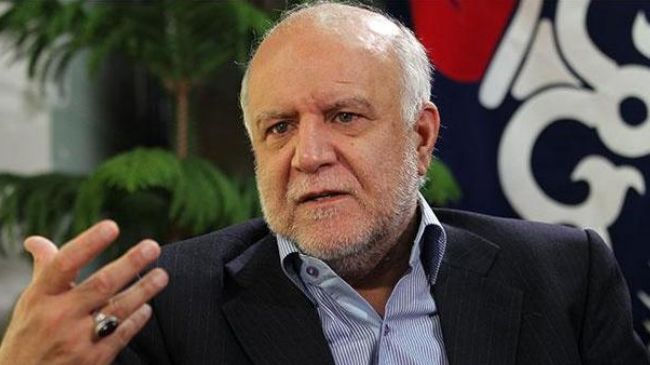Tehran calls on Tokyo to recover Iran’s share in its energy markets

By Sara Rajabova
Following the visit by the large delegation of the European countries to Iran, a Japanese delegation comprising trade officials and executives of major industries led by State Minister of Economy, Trade and Industry Daishiro Yamagiwa visited the Islamic Republic.
The Japanese delegation’s Iran visit is was aimed at quickly normalizing economic relations once sanctions are lifted on Tehran.
The delegation of 28 Japanese companies, 10 oil companies, and 18 banks and financial institutions arrived in Tehran on August 8 for a two-day visit and held talks with Iran's senior officials, including Oil Minister Bijan Namdar Zanganeh.
Along with resumption of Iran's oil industries, gas, and petrochemical activities, Zanganeh and Yamagiwa discussed approaches to resumption and development of economic and trade cooperation between the countries in the post-sanctions era, the Iranian media reported.
Iran voiced hope that Japan would regain its share of Iranian energy projects after sanctions on the Islamic Republic are lifted.
During the meeting with the Japanese minister, Zanganeh noted that before the imposition of the sanctions, Japan was one of the most important investors in Iran’s oil and projects.
Zanganeh said Japan would be able to recover Iran’s share in its energy market at a level prior to the strengthening of sanctions.
At the beginning of 1970, up to 30 percent of all Japanese oil imports came from Iran. After the victory of the Islamic revolution in Iran, this figure has gradually decreased, reaching 10 percent by 2010.
Japan was one of 11 nations exempted from sanctions on countries that buy oil from Iran. However, Japan’s oil imports from Iran were slashed in line with the country’s support for the international community over Iran’s nuclear energy program.
Japan joined the sanctions against Iran in 2011. The country imports on average about 100 million barrels of "black gold" in a month. Tokyo currently sources five percent of its crude oil from Iran under an interim deal between Iran and the West in November 2013.
Japan hopes to raise oil imports from Iran to the pre-sanctions level.
Zanganeh assured Tokyo on Iran’s 'willingness to negotiate with Japanese companies "on the development of oil fields and energy supply.
He also expressed hope for acquiring Japanese technology for oil production after the lifting of sanctions.
Zanganeh has recently said the government plans to introduce new oil contracts. Energy officials have said Iran has identified nearly 50 oil and gas projects worth $185 billion up for grabs.
Zanganeh underlined investment in Iran's production of liquid natural gas as an area of potential opportunity for cooperation with Japan. He also called for cooperation in Iran’s West Karoun area which comprises Yadavaran, North Azadegan, South Azadegan, North Yaran, and South Yaran oil fields. The biggest among all are South Azadegan and Yadavaran which are shared with Iraq’s Majnoon and Sinbad fields, respectively.
Yamagiwa, for his part, expressed hope that the nuclear agreement between Iran and world powers would pave the way for Iran and Japan to resume cooperation in the field of energy.
A senior Iranian Oil Ministry official said in July that it may be possible for Japan to resume participation in an oil field development project from which it withdrew nearly five years ago due to effects of strengthened U.S. sanctions against Tehran over its nuclear ambitions.
Japan’s return to the Azadegan project in southwestern Iran would signal the Middle Eastern country’s desire to make use of Japanese companies’ technical capabilities.
Tehran also invited Japanese banks to open branches in the Islamic republic. The proposal was presented to them by Valiollah Seif, the governor of the Central Bank of Iran.
Seif told the delegation that Iran had satisfactory cooperation with Japanese banks over the past few years, specifically in light of the U.S.-engineered sanctions against Tehran.
He emphasized that cooperation between Iranian and Japanese banks will help expand economic relations between the two countries.
Seif further stressed that Iran’s banking industry has seen many changes over the past years, adding that there are presently a number of private banks that are also capable of cooperating with their Japanese peers.
Japan has sent the first East Asian trade delegation to Iran after the nuclear deal between Iran and world powers on July 14.
The visit is the first by a Japanese trade official to Iran in 14 years and marks the first major dash by an Asian nation for business opportunities in the Islamic Republic after similar expeditions by the Europeans recently.
--
Sara Rajabova is AzerNews’ staff journalist, follow her on
Twitter: @SaraRajabova
Follow us on Twitter @AzerNewsAz
Here we are to serve you with news right now. It does not cost much, but worth your attention.
Choose to support open, independent, quality journalism and subscribe on a monthly basis.
By subscribing to our online newspaper, you can have full digital access to all news, analysis, and much more.
You can also follow AzerNEWS on Twitter @AzerNewsAz or Facebook @AzerNewsNewspaper
Thank you!
